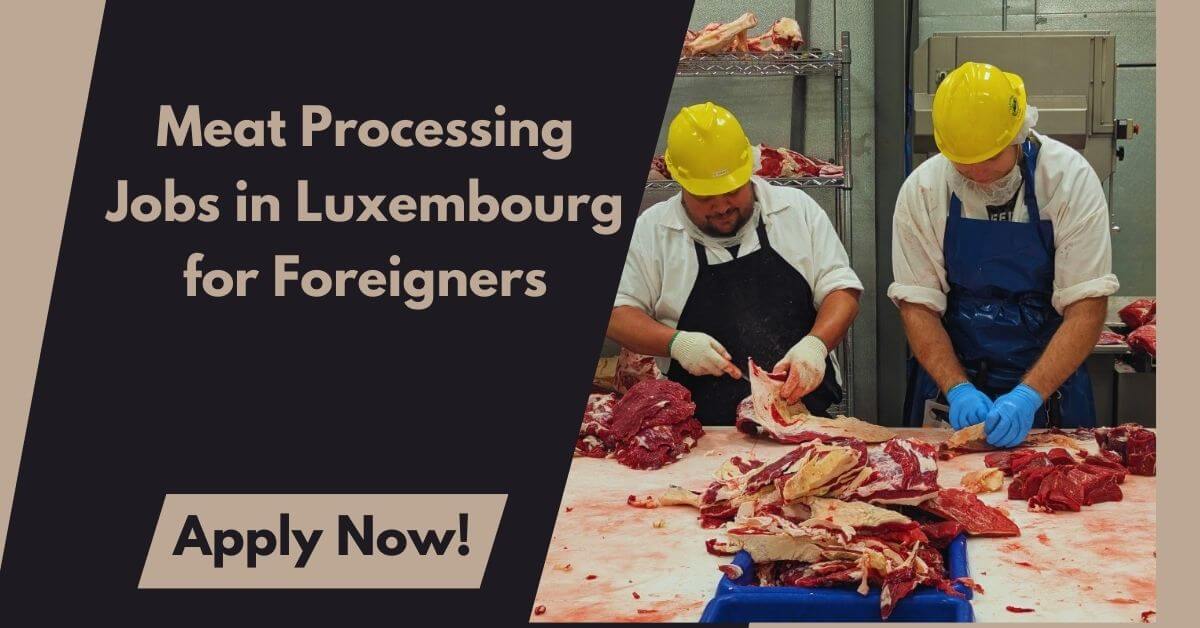“Meat processing jobs in Luxembourg for foreigners are in high demand, offering roles such as meat butcher, meat cutter, and meat production worker. Salaries range from €36,500 to €59,000 per year depending on experience and position. These jobs often include visa sponsorship and work permit support, making Luxembourg an attractive destination for skilled foreign workers in the meat processing industry.”
Details of Meat Processing Jobs in Luxembourg:
Key Points
- Country: Luxembourg
- Job Type: Full-Time | Permanent
- Visa Sponsorship: Available
- Language Requirement: English
- Age Requirement: Minimum 20 Years
- Qualification Required: High School Diploma or Equivalent
- Work Experience: Not Required
- Gender: Male / Female
- Eligible Nationalities: Open to Applicants Worldwide
- Hourly Salary: €21
Types of Meat Processing Jobs
The meat processing sector offers a variety of roles to suit different skill levels:
- Butchers:
- Clean, cut, and prepare meat for sale.
- Precision and knowledge of different cuts are required.
- Meat Packers:
- Assemble and package meat products on an assembly line.
- Ensure all products meet quality standards.
- Quality Control Inspectors:
- Inspect meat products for safety, freshness, and regulatory compliance.
- Attention to detail and understanding of health standards is essential.
- Machine Operators:
- Operate slicers, grinders, and packaging machines.
- Follow safety procedures and maintain equipment properly.
Work Responsibilities
Meat processing jobs include a wide range of duties to ensure smooth and safe operations:
- Cutting and Trimming Meat:
- Skillfully cut and debone meat to prepare for packaging.
- Operating Machinery:
- Safely operate specialized processing machines.
- Inspecting Meat Products:
- Check for freshness, quality, and compliance with safety standards.
- Maintaining Cleanliness:
- Sanitize work areas, tools, and equipment regularly.
- Packaging Meat Products:
- Properly package meat to preserve freshness and prevent contamination.
- Weighing and Labeling:
- Accurately weigh meat portions and label with relevant information.
- Monitoring Production Line:
- Oversee production processes and address disruptions promptly.
- Following Safety Protocols:
- Adhere to safety regulations and use protective gear as required.
- Storing Meat Products:
- Maintain proper storage temperatures and hygiene standards.
- Recording Data:
- Keep accurate records of production, maintenance, and other relevant data.
- Collaborating with Team Members:
- Work effectively in teams to achieve production targets.
- Handling Waste:
- Dispose of waste properly and minimize unnecessary waste generation.
Benefits of Meat Processing Jobs
Working in Luxembourg’s meat processing sector comes with several advantages:
- Competitive Wages: Higher pay compared to similar roles in other industries.
- Health Insurance: Coverage for medical, dental, and vision needs.
- Paid Time Off: Includes vacation, holidays, and sick leave.
- Retirement Plans: Access to pension or retirement savings programs.
- Job Stability: Consistent demand ensures steady employment.
- Overtime Pay: Additional compensation for extra hours worked.
- Training Opportunities: On-the-job training to enhance skills.
- Career Advancement: Potential promotions to supervisory or specialized roles.
- Employee Discounts: Discounts on meat products or company merchandise.
- Work Uniforms and Safety Gear: Provided at no cost.
- Transportation Assistance: Subsidies or transport services may be available.
- Housing Assistance: Some employers offer support with accommodations.
Salary in Luxembourg
- Entry-Level Meat Packers: €18/hour
- Experienced Butchers or Machine Operators: Up to €21/hour
- Annual Salary Range: €36,500–€59,000
- Additional Perks: Health insurance, overtime pay, and employee benefits
Even with Luxembourg’s relatively high cost of living, these roles are financially rewarding and provide excellent employment stability.
How to Apply
- Check Job Listings: Look for meat processing positions with visa sponsorship.
- Secure a Job Offer: Employers in Luxembourg will often sponsor work visas for qualified candidates.
- Submit Work Visa Application: Your employer helps with the work permit process.
- Travel and Start Work: After approval, you can move to Luxembourg and begin employment.
Conclusion
Meat processing jobs in Luxembourg are a promising opportunity for foreigners seeking stable employment, competitive wages, and visa sponsorship. Whether your interest lies in butchering, packing, quality control, or machine operations, these roles provide career growth, job security, and a chance to experience life in a beautiful European country.
Start your journey today by applying for meat processing jobs in Luxembourg and secure a rewarding career abroad!
Frequently Asked Questions
What types of meat processing jobs are available in Luxembourg?
Roles include butchers, meat packers, quality control inspectors, and machine operators, each with specific duties and skill requirements.
What is the salary range for meat processing workers in Luxembourg?
Hourly wages range from €18–€21, depending on experience and role. Annual salaries range from €36,500 to €59,000.
Is visa sponsorship available for foreign workers?
A: Yes, many employers offer visa sponsorship and work permit support for eligible foreign applicants.






